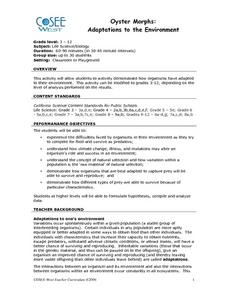Curated OER
Fitting In-Animals' Adaptations to Their Environment
In this animals' adaptation to their environment learning exercise, students read for comprehension and ability to apply knowledge. In this T-Chart and creative activities learning exercise, students answer three questions.
Curated OER
Migrate, Adapt, or Hibernate
For this migration and hibernation worksheet, students read a 2 page informational excerpt about animals who adapt to changing seasons by migrating or hibernating. They then use the information they learned to answer the 15 questions on...
Curated OER
The Peppered Moth
In this evolution worksheet, students read about the changes the peppered moth went through over 100 year time period. Students complete 3 short answer questions based on what they read.
Curated OER
What is a Plant?
In this plant characteristics worksheet, students will read a paragraph about plants and then use the information found in that paragraph to complete 3 short answer questions about plant adaptations.
Curated OER
Internet Assignment: Ducks
In this creative internet inquiry worksheet, learners research, answer and analyze a variety of facts and questions about ducks.
Curated OER
Geography, Ecology, and Folklife
Students identify how do geography and ecology influence a region's folklife. Then they investigate this question and consider how an outsider might view their own region in this lesson. Students also identify how the natural world, even...
Curated OER
Get Ready, Get Set, Hibernate
Students match each body part or idea from a work bank about methods of animal adaptations for winter survival. They observe as the first one, food is covered with the whole class before completing the rest of the diagram. They discuss...
Curated OER
Bird Bodies
Students read about and explore the different types of birds. They discuss how all birds are alike and what makes some different from the others. They experiment picking up "food items" using different tools that represent different...
Curated OER
Mammal Teeth and Skulls-Adaptations and Identification
Student study the differentiation of teeth and skull adaptations in mammals in general and 14 common terrestrial mammals. They explore more about these mammals, their natural history, their adaptations and their identification through an...
Curated OER
Create An Insect
Learners create a new species of insect. They create a list of insect characteristics and use this as a springboard to draw an insect of their own. Students write a brief descriptive paragraphs about their insect, giving particular...
Curated OER
Bird Land
Students role-playing the concept of evolution through naturally occurring mutations. Working in pairs, they model how birds have adapted to the food sources in their environment through changes in their beak size and shapes. Students...
Curated OER
Adaptations
Fifth graders are able to physically record on a sheet of paper predictions and results of an experiment pertaining to the adaptations of Arctic animals after a class discussion about the topic.
Curated OER
Through the Eyes of an Owl
Students describe vertebrates in terms of observable body parts and characteristics and describe life cycles of familiar organisms. They identify familiar organisms as part of a food chain or food web and describe their feeding...
Curated OER
Mimicry: An Example of Adaptation
Students are able to explain the relationship between adaptation and ability for survival and reproduction. They are able to give examples of a series of adaptations that would support the idea that evolution is a series of minor...
Curated OER
Social Sstudies: Change in Space and Time
Students examine the dynamics of change and compare and contrast it with other cultures. They cite examples of how people change over time and explain why it is necessary. Students organize a skit, Webpage, or Powerpoint presentation...
Curated OER
Fish Adaptations and Habitats
Students explore specific adaptations and how they pertain to the survival of the individual and the species. Students design a fish based on certain criteria and determine the type of habitat which would be best suited for their fish's...
Curated OER
Compare Human-made Objects with Natural Objects
Students examine and observe how many human-made objects get their basic design from things in nature. They listen to the book "Nature Got There First," compare/contrast hollow bones with drinking straws, bird beaks and tool pliers, and...
Curated OER
TE Lesson: Can You Taste It?
Students investigate how animals adapt to use its senses to identify foods that are nutritious or noxious. They determine how they associate foods with other things such as birthdays. They discuss the role of the nervous system in the...
Curated OER
Corals & Coral Reefs
Students describe a coral reef, how it is formed and its inhabitants. They explain the ecological and economic importance of coral reefs and discuss its present-day threats. Lesson contains adaptations for all levels.
Curated OER
Habitats and Adaptations
Students research and describe the habitat and adaptations of a reef animal. After the student is assigned a habitat, they design and draw a cresture adapted to eat each food and to live in each habitat.
Curated OER
Animal Adaptations
Students use items from boxes to dress up classmates as animals adapted to a given environment.
Curated OER
Oyster Morphs: Adaptations to the Environment
Students demonstrate how organisms adapt to their environment. They examine prey and predators, natural selection, and adaptations by representing oyster morph.
Curated OER
Marine & Aquatic Habitats Activities - Terrestrial Forests vs. Kelp Forests
Students discuss concept and specificity of habitats, both marine and terrestrial, list similarities and differences in the habitats of a kelp forest and a terrestrial forest, compare types of organisms that occupy corresponding types of...
Curated OER
So You Think the World Evolves Around You?
Students examine the topic of evolution as it relates to biodiversity in various remote areas of the world. They watch videos, conduct Internet research, and in small groups create a digital video report to illustrate common evolution in...
























